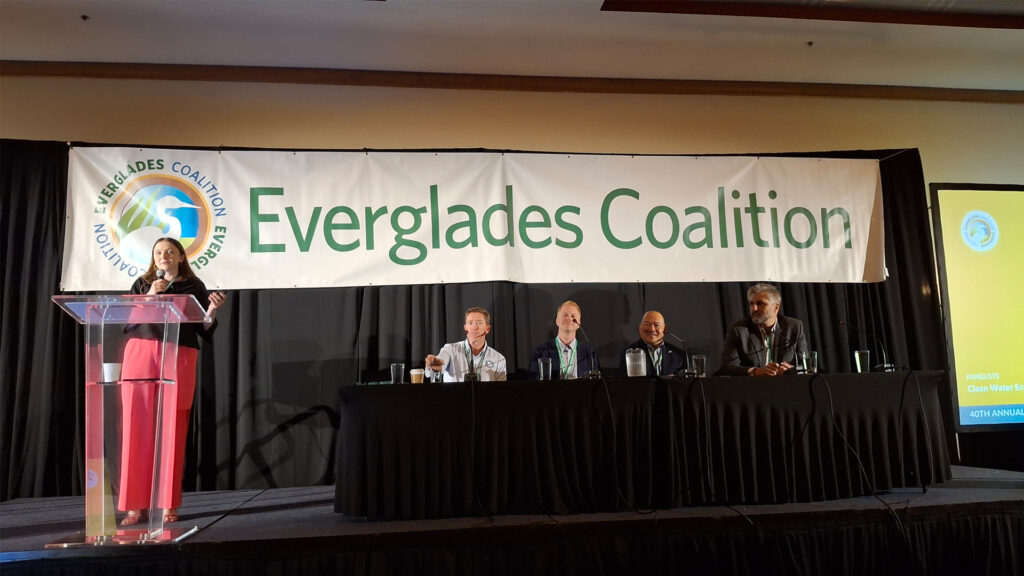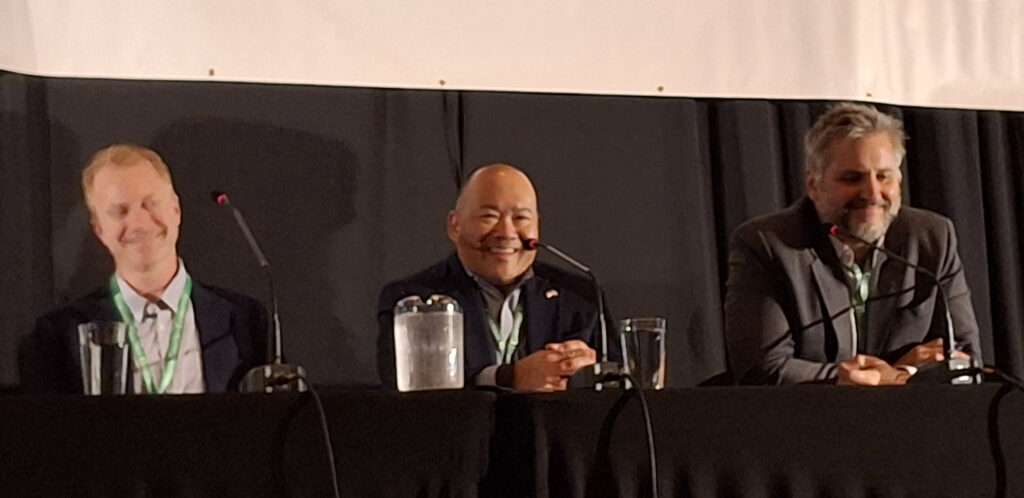By Arielle Perry, FAU Center for Environmental Studies
Florida’s economy runs on clean water, according to speakers at a panel discussion Friday at the 40th Annual Everglades Coalition Conference.
Restoring the Everglades is critical to businesses across South Florida, said Paul Hindsley, chief economist for The Everglades Foundation, during the panel discussion on the “Clean Water Economy.” Hindsley cited tourism, real estate and outdoor recreation as among the industries that rely on clean water provided by the Everglades.
“The clean water economy – so, those industries that are connected to water in our South Florida ecosystems … generates about 25% of our regional GDP,” Hindsley said.

Hosted by the National Parks Conservation Association, the Everglades Coalition Conference was held Jan. 30 to Feb. 1 at the Miccosukee Casino and Resort in Miami. The event included panel discussions on topics ranging from Everglades restoration to traditional Indigenous ecological knowledge.
During the “Clean Water Economy” panel, speakers discussed how Florida’s economy is inextricably tied to clean water. Panelists provided examples of how local economies were disrupted due to water quality issues.
Sanibel & Captiva Islands Chamber of Commerce President John Lai described a large hotel occupancy decline on the Sanibel and Captiva islands in 2018 as a result of a red tide and a blue-green algae event.
“What we saw during that time was, on average, of just Sanibel and Captiva Islands alone, about a million dollars a week being lost from our local economies, and that’s restaurants, hotels, retailers and professional services,” Lai said.
Steve Friedman, a Village of Islamorada councilman and boat captain, detailed how he was personally impacted by the 2015 seagrass die-off in Florida Bay and the Keys. Unable to navigate his boat more than 500 yards through the water because of all the dead, floating seagrass, Friedman was inspired to learn more about the issue.
“That was really what kind of started it, for me, in terms of trying to understand why this happened and what we can do to prevent it,” he said.
Speakers also discussed their responses to various water crises. Friedman explained how he decided to run for state representative in 2018 to draw attention to and support Everglades restoration measures. Now, he regularly takes people out on his boat to educate them on the Everglades and its importance to clean water.

“I learned that the more people that I take out in the water and show them my office, the more they’re engaged, the more they care,” Friedman said.
Similarly, Lai highlighted how he worked with the Sanibel-Captiva Conservation Foundation, Captains for Clean Water and The Everglades Foundation to create a business program that emphasizes the importance of Everglades restoration among the business community in the Sanibel and Captiva islands. The program, Preserving Paradise, selects 25 business leaders throughout Southwest Florida and educates them on the importance of Everglades restoration and the role water quality plays in a healthy economy.
“Our partners in the business industry want to (protect the environment), they just don’t know how to, so we’ve got to provide those tools to allow them to do that,” Lai said.
Friedman believes the public outcry over harmful algal blooms and seagrass die-offs helped expand conversations regarding water quality among residents and fishing guides in the Keys.
He contends the additional public support is translating into more money being allocated for Everglades restoration and “a general awareness and care of the environment.
“If we don’t have a healthy ecosystem, we won’t have a healthy economy,” Friedman said.
Arielle Perry is a master’s student in the Environmental Science Program at Florida Atlantic University and is a graduate research assistant at FAU’s Center for Environmental Studies. The center manages The Invading Sea. Banner photo: Everglades National Park. (Daniel Kraft, CC BY-SA 3.0, via Wikimedia Commons).
Sign up for The Invading Sea newsletter by visiting here. To support The Invading Sea, click here to make a donation. If you are interested in submitting an opinion piece to The Invading Sea, email Editor Nathan Crabbe at ncrabbe@fau.edu. To learn more about harmful algal blooms, watch the video below.




Eighty percent of our springs are polluted or what our state calls impaired. 9000 miles of our rivers and streams are polluted with fecal bacteria. We have more polluted waters than any other state and Lake O is the second most polluted lake in our country. Our manatees are still dying from starvation or some kind of intestinal problems. Their food can not grow in the impaired waters. Red tides are coming more often and blue-green algae can cause deadly diseases. We are not enforcing our laws. The polluters are still ruling. And yes, as people find out or get sick our tourism dollars diminish.
“Climate change” and heat in Florida can be deadly and horrifying. But we have taken those two words out of our laws. The effects will still haunt us … and worsen water quality.
Floridarighttocleanwater.org, a citizen’s initiative to put people’s right to clean water over polluter’s rights would be a great step. It would have been nice to mention that during the panel.
Please educate yourself and others about FloridaRighttoCleanWater.org and help with a donation and signatures. An amendment to have a fundamental right to clean water will help. And Florida waters need a lot of help.